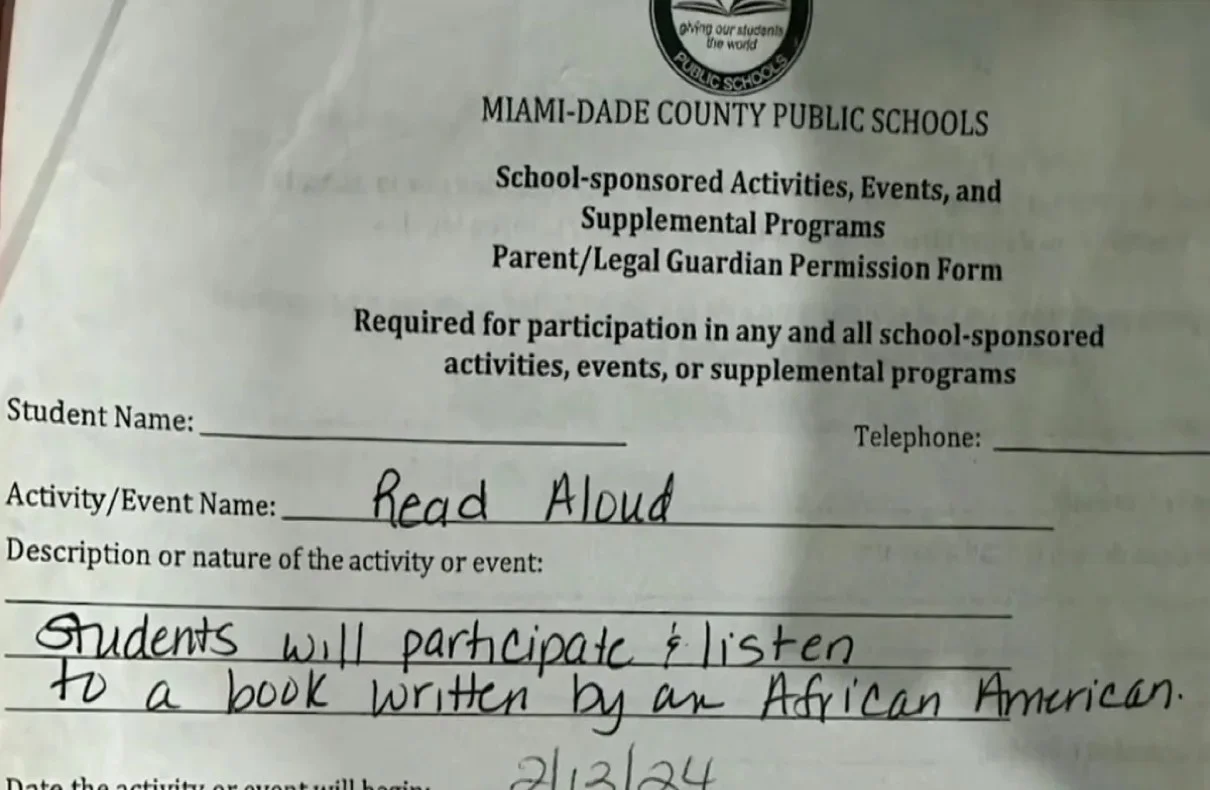The Miami-Dade County Public School District recently found itself embroiled in a controversy over a permission slip that sparked widespread backlash during Black History Month. The permission slip, issued by Coral Way K-8 Center, requested parental consent for students to participate in a book reading by an African-American author. While the school district maintains that the slip was in compliance with a statewide education rule, critics argue that it hampers educational opportunities and reflects a larger debate around parental rights.
The controversy began when a parent named Chuck Walter shared a photo of the permission slip on social media, expressing his concerns about the requirement for parental consent to allow students to participate in a book reading by an African-American author. The slip, issued by Coral Way K-8 Center, described the activity as a “read aloud” session where students would have the opportunity to listen to a book written by an African-American author. While the intention behind the permission slip was to comply with the Parental Rights in Education Law, it quickly garnered attention and criticism.
The viral nature of the permission slip led to widespread backlash and confusion among parents, school board members, and the broader community. Many questioned the necessity of seeking parental permission for an activity that supports diversity and inclusion. Some argued that the requirement could create division among parents and hinder educational opportunities for students. Jill Peeling, a parent from another Miami institution, IPrep Academy, expressed her concerns about the permission slip, stating that it raises questions about academic freedom and parental rights.
In response to the controversy, Miami-Dade County Public Schools Superintendent Dr. Jose L. Dotres and administrators held a meeting to address the concerns raised by the viral tweet. Dr. Dotres clarified that there was no need for any parent permission slip and emphasized the importance of seeking clarity to ensure that permission slips are only used when necessary. The school district acknowledged the confusion caused by the description of the event and pledged to work with schools to improve clarity in communicating activities that require parental permission.
Catholic Church in Istanbul: 1 Man Killed by Masked Gunmen
The controversy surrounding the permission slip extends beyond Coral Way K-8 Center. The requirement for permission slips is rooted in a statewide education rule that aims to give parents greater control over their children’s education. The rule, approved by the State Board of Education, mandates that schools fully inform parents about field trips, extracurricular activities, and supplemental programs. While the intention is to ensure transparency and parental involvement, critics argue that it may have unintended consequences, as seen in the Miami-Dade County controversy.
The Miami-Dade County controversy has sparked a broader debate about the balance between parental rights and educational opportunities. Supporters of the permission slip requirement argue that it allows parents to have a say in their children’s education and ensures that sensitive topics are approached in a way that aligns with their values. However, opponents, including Miami-Dade School Board Member Steve Gallon III, raise concerns about the potential for unequal learning experiences and argue that it undermines the authority of educators and the comprehensive curriculum required by state law.
One of the main concerns raised by critics of the permission slip requirement is the potential for missed educational opportunities. School Board Member Steve Gallon III expressed worry that students could be denied valuable lessons in Black history and the Holocaust if permission slips are not properly addressed. He emphasized that these topics are mandatory under state law and do not require additional permission. Gallon called for a balance between parental rights and ensuring that all students receive a comprehensive education.
The Miami-Dade County controversy reflects a larger trend in Florida, where discussions around parental rights and curriculum content have gained prominence. Governor Ron DeSantis and Republicans have been pushing for restrictions on lessons related to race, gender, and sexuality, leading to what some critics describe as a “war on woke.” Democrats argue that these restrictions limit critical discussions and hinder students’ understanding of diverse perspectives. The Miami-Dade County controversy serves as a microcosm of these statewide debates.
Amid the backlash and confusion surrounding the permission slip controversy, the need for clarity in communication between schools and parents becomes evident. The Miami-Dade County Public School District recognizes the importance of improving clarity in describing activities and events that require parental permission. By addressing the confusion and ensuring effective communication, the district aims to strike a balance between parental rights and educational opportunities.
The permission slip controversy in Miami-Dade County has shed light on the complex interplay between parental rights, educational opportunities, and curriculum content. It has sparked a broader discussion about the role of parental involvement in schools and the need for comprehensive education that encompasses diverse perspectives. As the debate continues, finding a balance that respects parental rights while ensuring that all students receive a well-rounded education will remain a crucial challenge for educators, policymakers, and communities.
